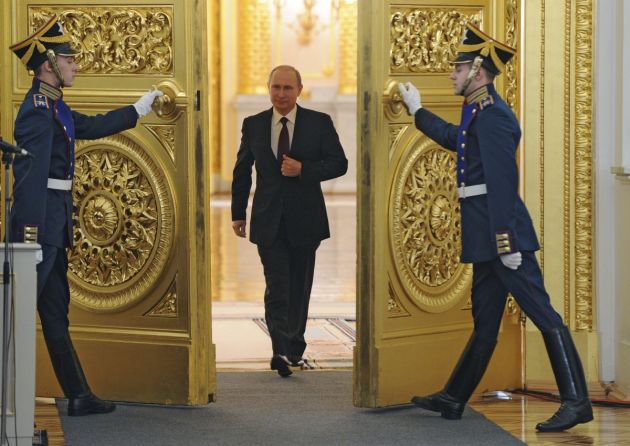Putin says Russia's power is moral as well as military

MOSCOW (Reuters) - President Vladimir Putin warned the West on Thursday not to underestimate Russia's military might but cast his country as a force for moral good and a bastion of traditional values.
In his annual state-of-the-nation speech, Putin portrayed Russia as a country of growing importance and as a moral counterweight to the United States, despite the loss of its Cold War status as a superpower.
He used the occasion to reinforce his image as a champion of conservative values, intended to appeal to his traditional supporters in working-class areas outside big cities following protests against his rule led by young urban professionals.
"Nobody should have any illusion about the possibility of gaining military superiority over Russia," Putin told hundreds of members of parliament, businessmen and government and church leaders in a vast and ornate Kremlin hall.
"We will never allow this to happen. Russia will respond to all these challenges, political and military."
Putin's assertive tone reflected Russia's stronger international profile since helping to bring about a deal to dismantle Syria's chemical weapons, averting the threat of U.S. military strikes against Damascus.
Russia is also competing with the European Union for influence over former Soviet republics, especially Ukraine, where pro-European demonstrators are staging mass protests against a government that is leaning closer to Moscow.
"We do not aspire to be called some kind of superpower, understanding that as a claim to world or regional hegemony," he said. "We do not infringe on anyone's interests, we do not force our patronage on anyone, or try to teach anyone how to live."
RIGHTS RECORD
Russia's image and its human rights record are under international scrutiny as it prepares to host the Winter Olympics in Sochi in less than two months' time, an event on which Putin has staked much of his own prestige.
He faces criticism in the West over a law banning 'gay propaganda' which critics say encourages discrimination against homosexuals.
But with the head of the Russian Orthodox Church sitting in the front row of the Kremlin's St George Hall, he shrugged that off, saying his views would increase respect for Russia.
"We know there are ever more people in the world who support our position in defence of the traditional values that for centuries have formed the moral foundation of civilisation," he said, putting "traditional family values" top of the list.
He called for unity among ethnic groups, greater patriotism and attempts to increase the population. Families with three children, a rarity in Russia, should be the norm, he said.
Putin, 61, has frequently appealed to such values since he returned to the presidency for a third term in May 2012. He has portrayed the Church as a moral guide for a nation unmoored by the 1991 collapse of the Soviet Union.
(Additional reporting by Lidia Kelly, Thomas Grove and Vladimir Soldatkin; Writing by Steve Gutterman; Editing by Timothy Heritage)